Submitted:
08 December 2023
Posted:
12 December 2023
You are already at the latest version
Abstract
Keywords:
1. Introduction
2. Related Research
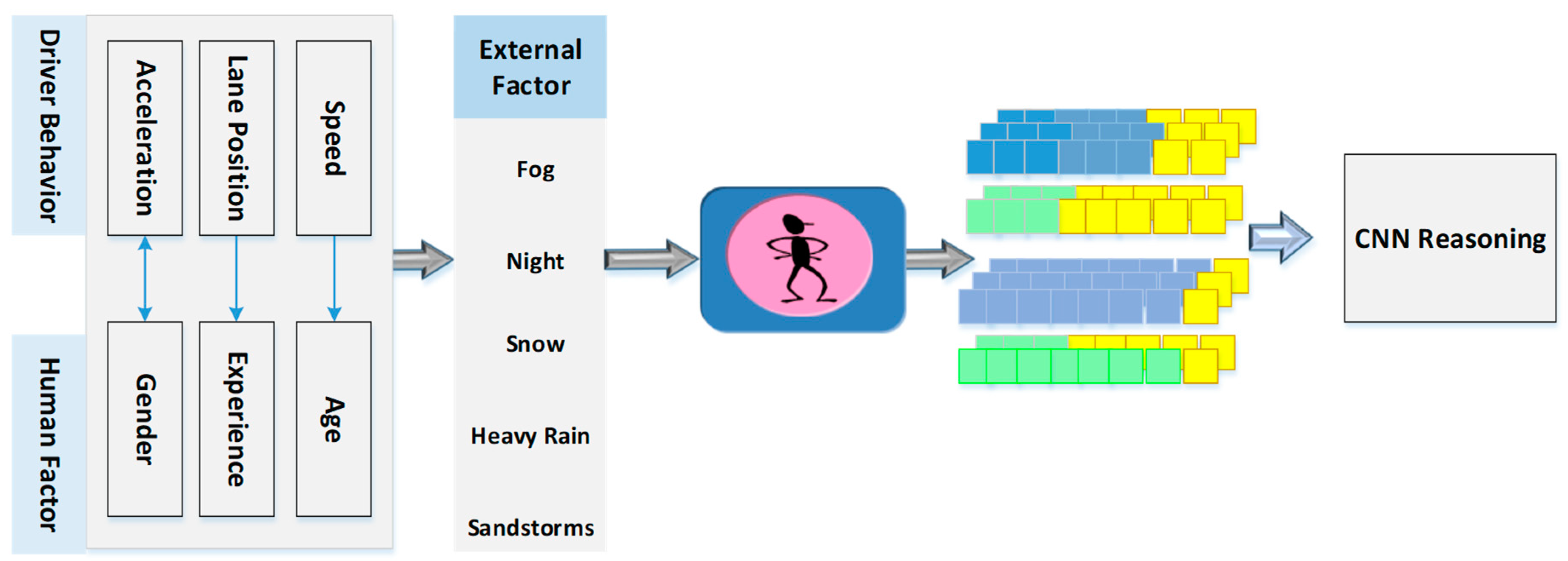
3. Methodology
3.1. The CNN Reasoning Approach
3.2. Data Collection
3.3. Algorithm Description
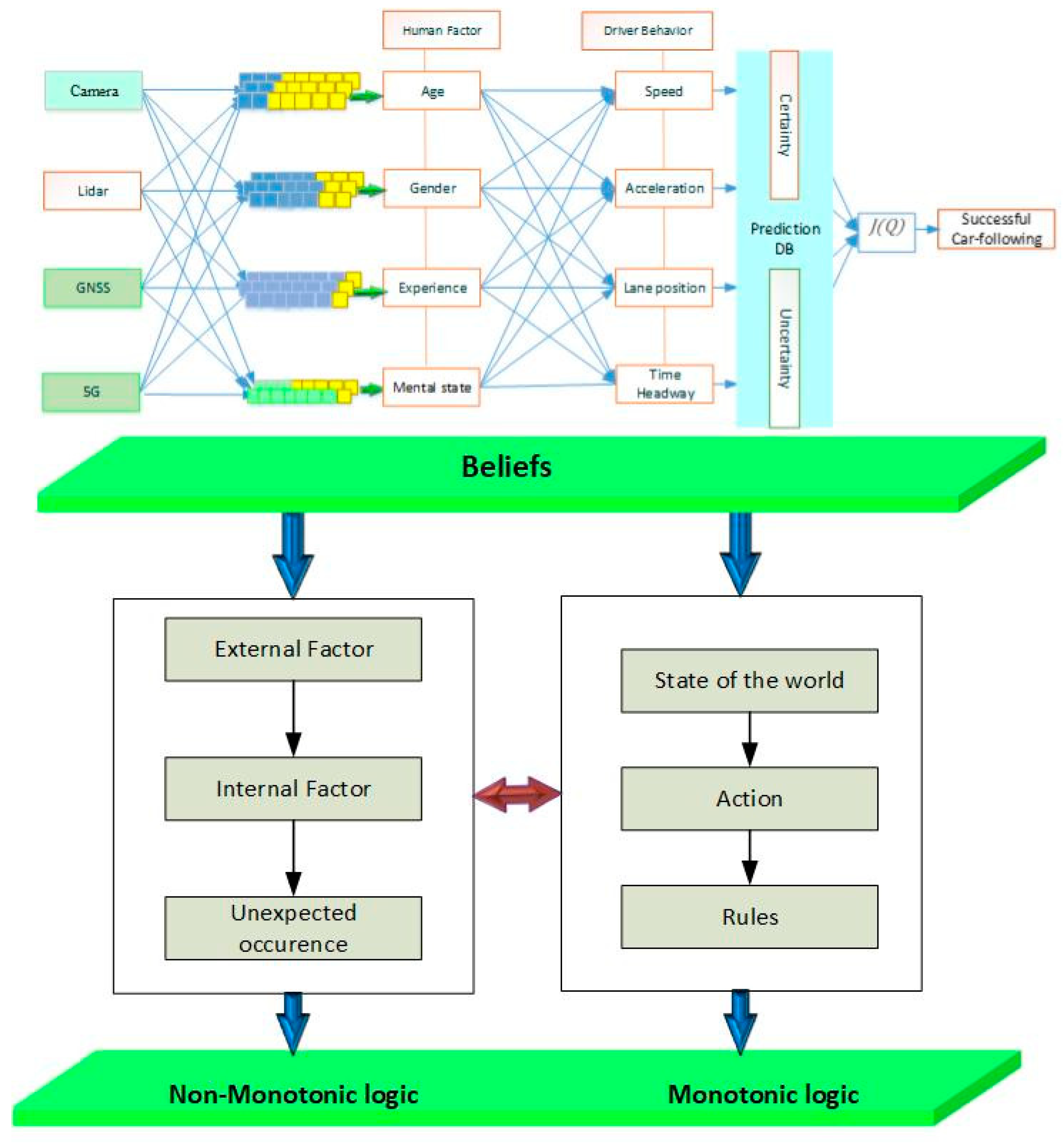
3.4. Feature extraction
3.5. Reasoning-Based Non-Monotonic Logic
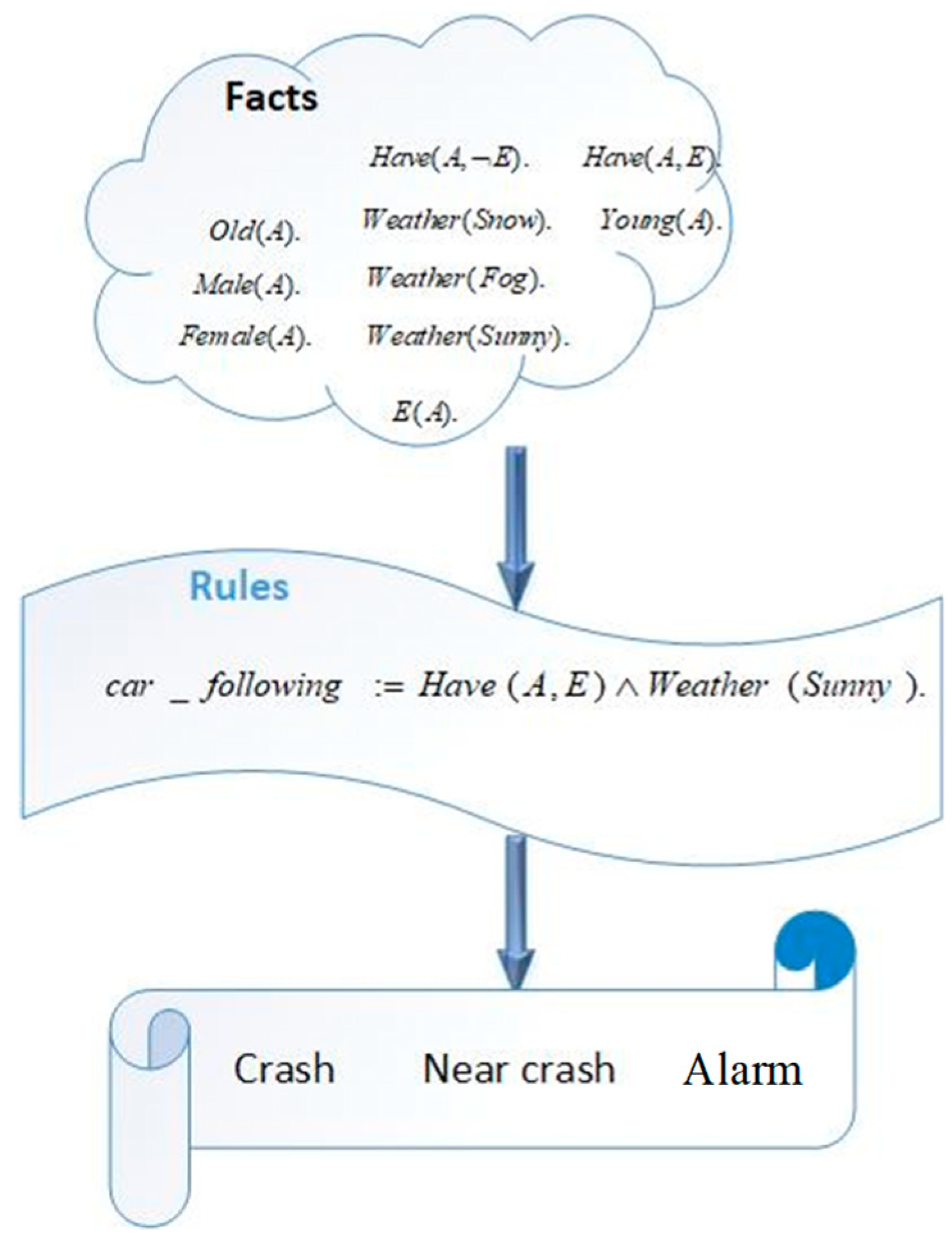
4. Discussion and Analysis
- (i)
- ’aggressive’: a shorter car time headway, (0–2 s);
- (ii)
- ’inattentive’: a longer reaction time (2–3 s);
- (iii)
- ’normal’ for intermediate values of reaction time and car time headway (longer than 3 s), i.e., maintaining adaptive cruise control, which is expressed in terms of adaptive relative distance [m] and constant relative speed [m/s].
- ○
- Aggressive driver profile: A driver i is considered to be aggressive with respect to a threshold t*, for the time headway THW if
- ○
- Inattentive driver profile (a driver with a long reaction time): A driver i is considered to be inattentive (with a long reaction time) with respect to a threshold on the time headway THW if
- ○
- Normal driver profile: Drivers whose profiles are neither aggressive or inattentive are called normal. They have intermediate values for reaction time headway (e.g., <1 s).
4.1. The Combination of Human Factors and Driving Behaviors
5. Simulation Results
6. Conclusions
Funding
Data Availability Statement
Conflicts of Interest
References
- Yarlagadda, J.; Pawar, D.S. Heterogeneity in the Driver Behavior: An Exploratory Study Using Real-Time Driving Data. Hindawi J. Adv. Transp. 2022, 2022, 4509071. [Google Scholar] [CrossRef]
- Zhai, C.; Wu, W. A new car-following model considering driver’s characteristics and traffic jerk. Nonlinear Dyn. 2018, 93, 2185–2199. [Google Scholar] [CrossRef]
- Raiyn, J.; Weidl, G. Improving Autonomous Vehicle Reasoning with Non-Monotonic Logic: Advancing Safety and Performance in Complex Environments, 2023 IEEE International Smart Cities Conference, University POLITEHNICA of Bucharest, Romania on 24 – 27 September, 2023.
- Bouhsissin, S.; Sael, N.; Benabbou, F. Driver Behavior Classification: A Systematic Literature Review. IEEE Access 2013, 11, 14128–14153. [Google Scholar] [CrossRef]
- Weidl, G.; Madsen, A.L.; Wang, S.R.; Kasper, D.; Karlsen, M. Early and Accurate Recognition of Highway Traffic Maneuvers Considering Real-World Application: A Novel Framework Using Bayesian Networks. IEEE Intell. Transp. Syst. Mag. 2018, 10, 146–158. [Google Scholar] [CrossRef]
- Abdar, M.; Pourpanah, F.; Hussain, S.; Rezazadegan, D.; Liu, L.; Ghavamzadeh, M.; Fieguth, P.; Cao, X.; Khosravi, A.; Acharya, R.; et al. A Review of Uncertainty Quantification in Deep Learning: Techniques. Inf. Fusion 2021, 76, 243–297. [Google Scholar] [CrossRef]
- Bhargavi, R. Road Rage and Aggressive Driving Behavior Detection in Usage-Based Insurance Using Machine Learning. Int. J. Softw. Innov. 2019, 11, 1–29. [Google Scholar] [CrossRef]
- Wang, J.; Li, K.; Lu, X.-Y. Effect of Human Factors on Driver Behavior. In Advances in Intelligent Vehicles; Academic Press: Cambridge, MA, USA, 2013; pp. 111–155. [Google Scholar]
- Hiang, T.S.; Ming, G.L. Speeding driving behavior: Age and gender experimental analysis. MATEC Web Conf. 2016, 74, 30. [Google Scholar]
- Rousseeuw, P.J. Silhouettes: A Graphical Aid to the Interpretation and Validation of Cluster Analysis. Comput. Appl. Math. 1987, 20, 53–65. [Google Scholar] [CrossRef]
- Nguyena, T.T. , Krishnakumaria, P., Calverta, S-C., Vub, H-L. Lintam H.(2019). Feature extraction and clustering analysis of highway congestion, Transportation Research Part C: Emerging Technologies, vol 100, March 2019, Pages 238-258. 20 March.
- Lee, D.; Guldmann, J.-M.; von Rabenau, B. Impact of Driver’s Age and Gender, Built Environment, and Road Conditions on Crash Severity: A Logit Modeling Approach. Int. J. Environ. Res. Public Health 2023, 20, 2338. [Google Scholar] [CrossRef] [PubMed]
- Wang, J.; Zhang, L.; Lu, X.; Li, K. Driver Characteristics Based on Driver Behavior. In Ehsani; 2013.
- Oppenheim, M.; Parmet, I.; Oron-Gilad, Z.T. Can Driver Behavior Be Traced to Gender Role, Sex and Age? Adv. Transp. 2022, 60, 450–459. [Google Scholar] [CrossRef]
- Lee, D.; Guldmann, J.-M.; von Rabenau, B. Impact of Driver’s Age and Gender, Built Environment, and Road Conditions on Crash Severity: A Logit Modeling Approach. Int. J. Environ. Res. Public Health 2023, 20, 2338. [Google Scholar] [CrossRef] [PubMed]
- Shahverdy, M.; Fathy, M.; Berangi, R.; Sabokrou, R. Driver behavior detection and classification using deep convolutional neural networks. Expert Syst. Appl. 2020, 149, 113240. [Google Scholar] [CrossRef]
- Liu, X.-K.; Chen, S.-L.; Huang, D.-L.; Jiang, Z.-S.; Jiang, Y.-T.; Liang, L.-J.; Qin, L.-L. The Influence of Personality and Demographic Characteristics on Aggressive Driving Behaviors in Eastern Chinese Drivers. Psychol. Res. Behav. Manag. 2022, 15, 193–212. [Google Scholar] [CrossRef] [PubMed]
- Ley, H.; Sridharan, M. Integrating Non-Monotonic Logical Reasoning and Inductive Learning With Deep Learning for Explainable Visual Question Answering. Front. Robot. AI 2019, 6, 125. [Google Scholar] [CrossRef]
- Szalas, A. Decision-making support using non-monotonic probabilistic reasoning. In Intelligent Decision, Technologies 2019: Proceedings of the 11th KES International Conference on Intelligent Decision Technologies (KES-IDT 2019), Malta, 17–19 June 2019; Volume 142 of Smart Innovation, Systems and Technologies; Springer: Singapore; Volume 1, pp. 39–51. Volume 1.
- Raiyn, J.; Weidl, G. Naturalistic Driving Studies Data Analysis Based on a Convolutional Neural Network. In Proceedings of 9th international Conference on Vehicle Technology and Intelligent Transportation Systems, 2023; pp. 248–256, ISBN 978-989-758-652-1, ISSN 2184-495X.
- L3pilot Automation Driving. Available online: https://l3pilot.eu/ (accessed on 14 November 2023).
- Raiyn, J. (2021). Classification of Road Traffic Anomaly Based on Travel Data Analysis, International Review of Civil Engineering (IRECE), Vol. 12. No.6.
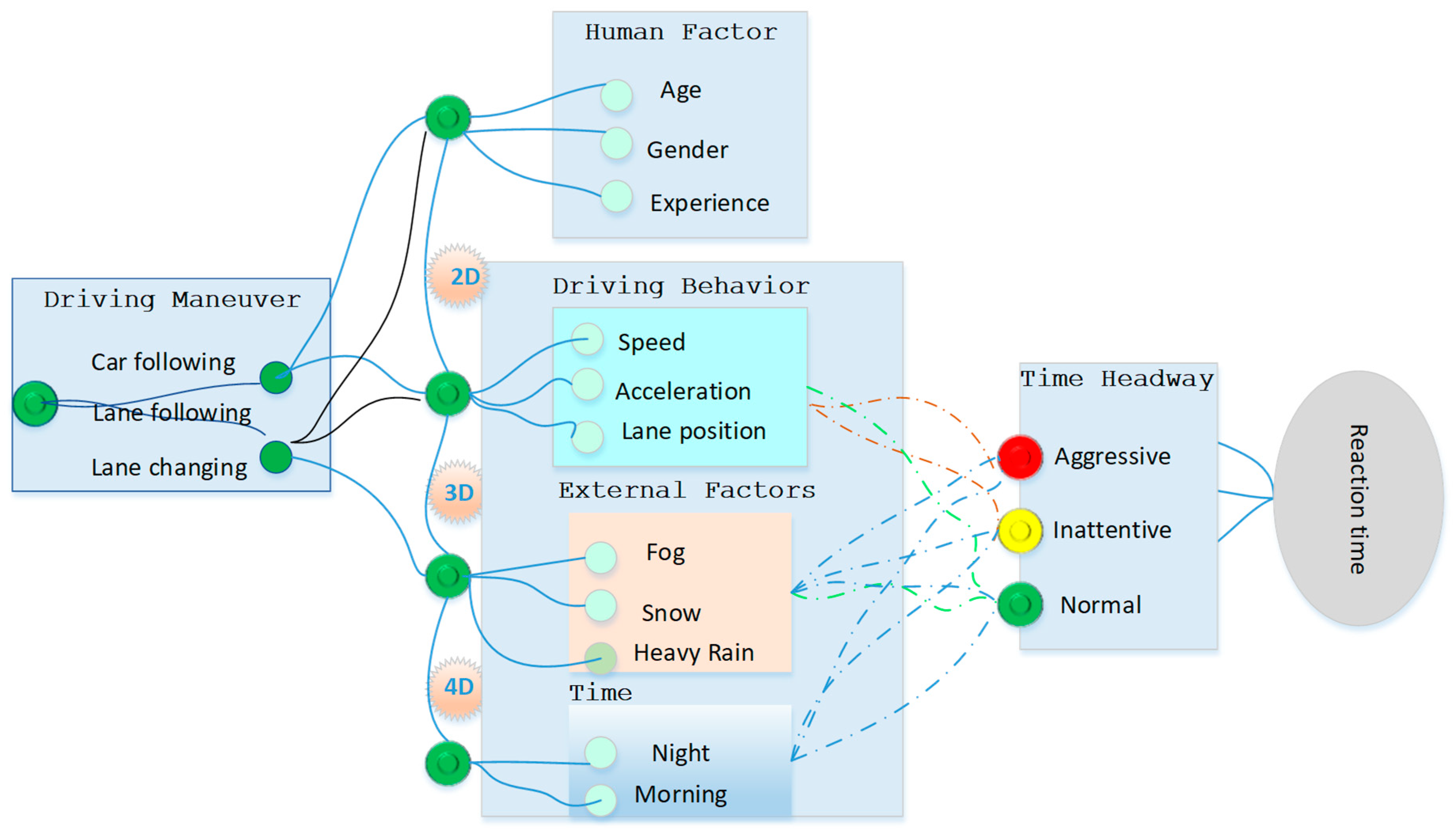

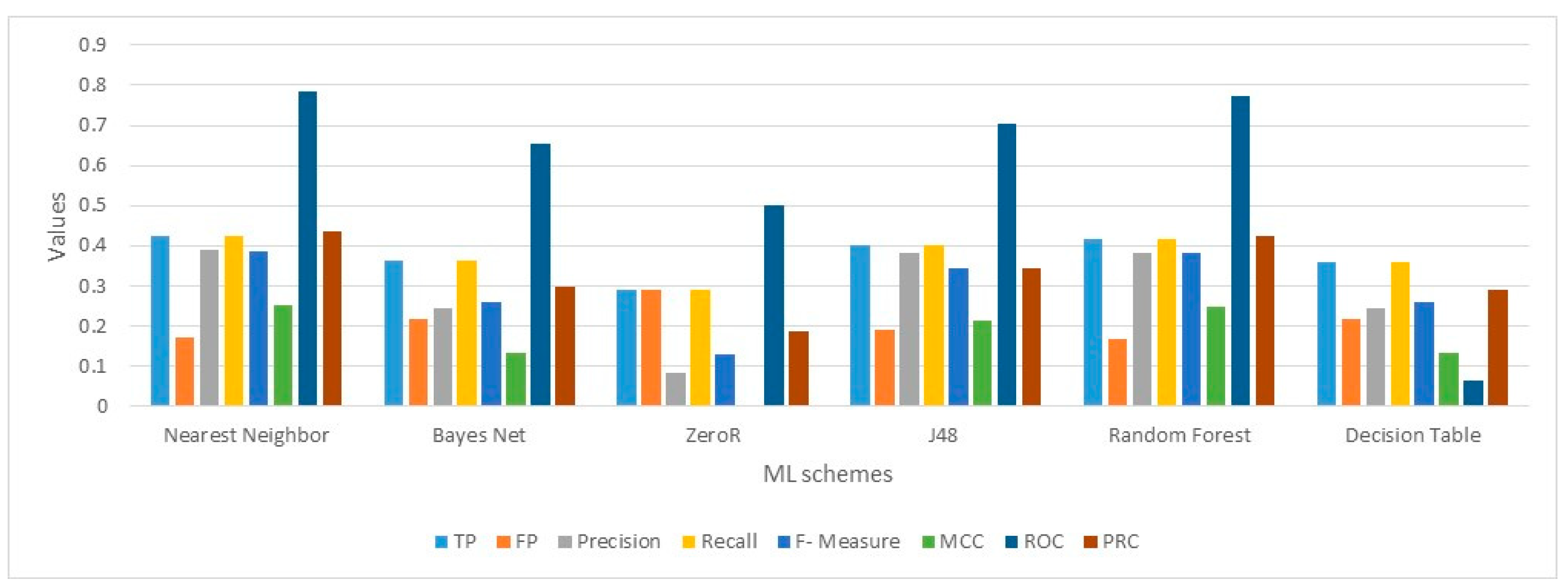
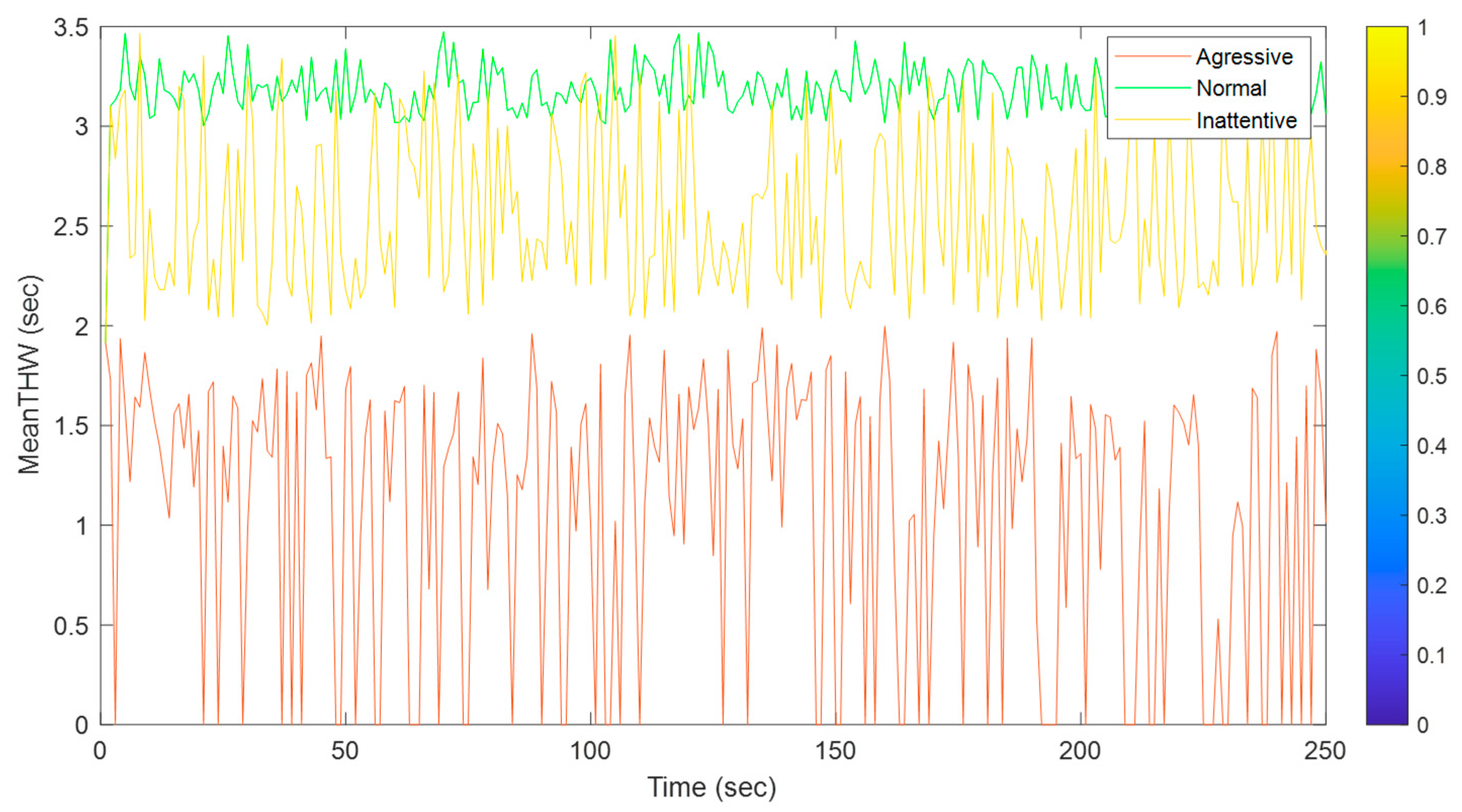
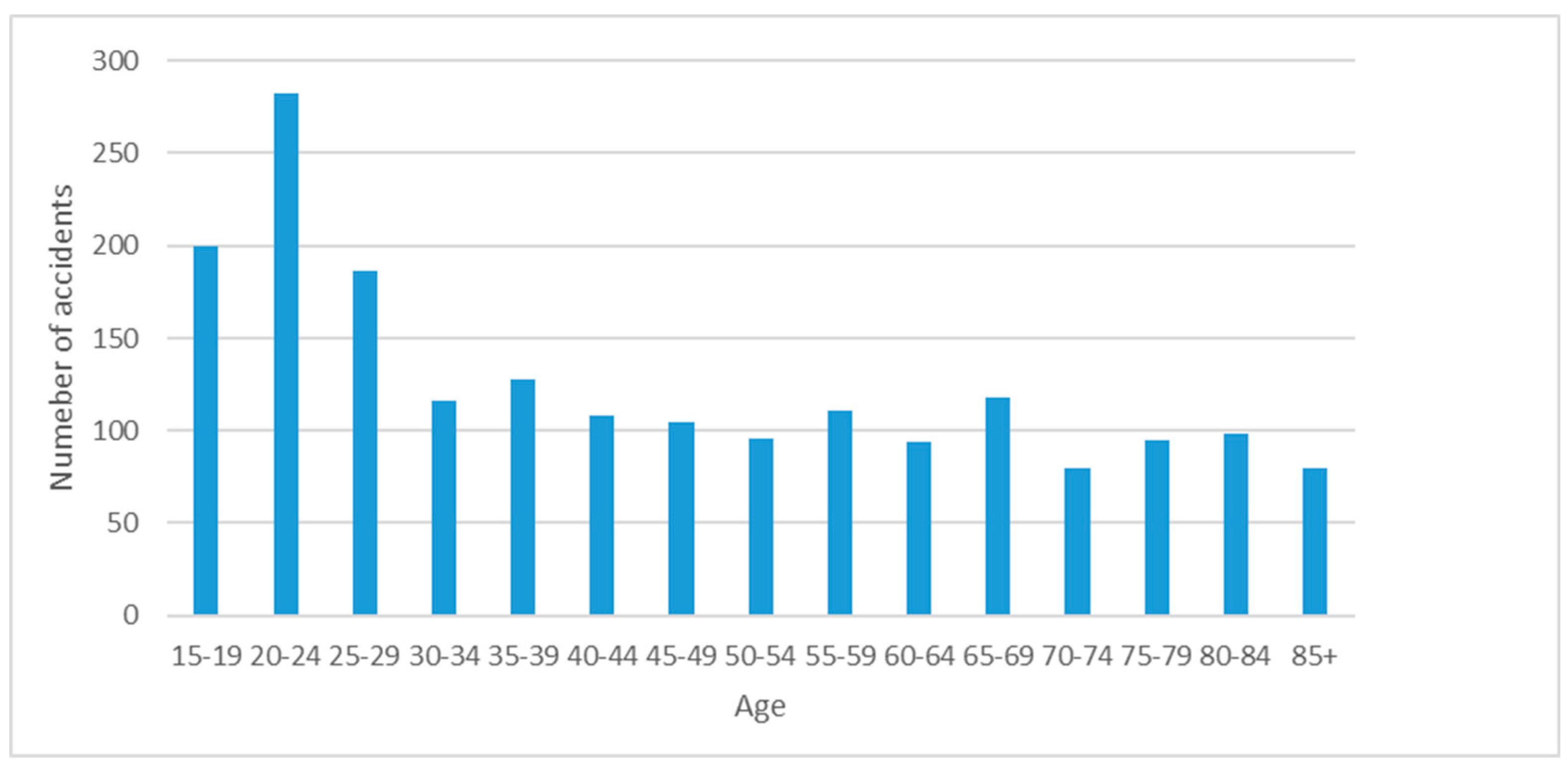


| Notation | Description | Symbol |
|---|---|---|
| Min_ax Max_ax SD_ax SD_ay Mean_v SD_v Max_abs_ay Max_v Mean_pos_in_line Mean_THW |
Minimum longitudinal acceleration Maximum longitudinal acceleration StDEV of longitudinal acceleration StDEV of lateral acceleration Mean speed Standard deviation of speed Maximum absolute lateral acceleration Max speed Mean position in lane Mean time headway |
min(ax) max(ax) sd(ax) sd(ay) m(v) sd(v) max(|ay|) max(v) sd(Pos in lane) m(THW) |
| B | E | Alarm | C | E | Alarm |
| F | F | F | F | F | F |
| F | T | F | F | T | F |
| T | F | T | T | F | T |
| T | T | F | T | T | F |
| a) | b) | ||||
| NN | NBN | zeroR | J48 | RF | DT | |
|---|---|---|---|---|---|---|
| MAE | 0.1687 | 0.186 | 0.200 | 0.182 | 0.169 | 0.190 |
| RMSE | 0.290 | 0.306 | 0.316 | 0.301 | 0.292 | 0.307 |
| RAE | 84.033 | 93.07 | 93.07 | 90.676 | 84.288 | 95.049 |
| RRSE | 91.663 | 96.83 | 96.83 | 95.241 | 92.274 | 96.950 |
Disclaimer/Publisher’s Note: The statements, opinions and data contained in all publications are solely those of the individual author(s) and contributor(s) and not of MDPI and/or the editor(s). MDPI and/or the editor(s) disclaim responsibility for any injury to people or property resulting from any ideas, methods, instructions or products referred to in the content. |
© 2023 by the authors. Licensee MDPI, Basel, Switzerland. This article is an open access article distributed under the terms and conditions of the Creative Commons Attribution (CC BY) license (http://creativecommons.org/licenses/by/4.0/).





